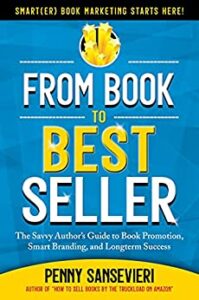 by Penny Sansevieri
by Penny Sansevieri
Book promotion on Amazon is important, but it’s more important to do things right; otherwise you’re losing money and getting discouraged. Since Amazon opened up its ads to everyone, we’ve seen a flood of authors start up ad campaigns; sadly, most of them fail.
There are many reasons Amazon ads don’t do well, not the least of which is that Amazon ads aren’t easy. They take a lot of effort to set up and manage, and there’s also the ever-changing Amazon landscape. And with books being added to that site daily, the metrics constantly change.
I’ve managed thousands of ad campaigns since Amazon started to offer ads, and based on my experience, I’ve pulled together the top reasons ads fail to attract readers, don’t do well, or cost you a lot of money. So let’s dig in!
You Don’t Have Enough Keywords
This is a big one. Many authors start Amazon ads with five keywords to see what happens. To gain traction, you absolutely must start with a higher number. I recommend 300 to 400, and if that number made you gasp, then consider this:
I don’t need you to find 400 unique keywords. I need you to find 100-150 and save them as different match types. So, you’ll save them as broad, exact, and phrase matches, which will allow you to watch and see how the same keyword does under these different match types.
You Run Too Many Ads
There’s a somewhat popular theory about running lots and lots of ads, but I’m not a fan of this. The reason is simple: when you run a lot of ads, you end up reusing lots of the same keywords. This means your ads cannibalize each other, you literally bid against yourself for placement, and your book promotion on Amazon actually works against you.
I talked with a Google Adwords representative who told me people use this methodology for Google Adwords (which is where the idea comes from), and he said there’s no faster way to lose your money than to run a bunch of ads.
In fact, if you’re new to Amazon ads, start with one ad; pick either a keywords-based ad or a product-based ad. Don’t start one ad with the automatic ads; I don’t disagree that those seem easy, but they cost you a lot of money. Sometimes they do well, but automatic ads require much more hand-holding than product or keyword based ads. That’s been my experience, anyway.
You Use the Wrong Keywords or Keyword Blends
Whenever I pull together keywords for an author’s ad campaign, I use keywords I find right on the Amazon site. I don’t use software or shortcuts. Why? Because finding keywords trending on Amazon is a great way to dip into consumer trends, too, which is something software often doesn’t capture.
The other issue is the blend of keywords vs. book titles and author names. If I work with a fiction book, I do 80 percent book titles and author names and 20 percent keywords. If I’m working on an ad set for nonfiction books, the numbers are reversed, so 80 percent keywords and 20 percent book titles and authors.
The reason for this blend is simple. A consumer searching for a nonfiction book always searches for benefits and/or a specific topic. A reader looking for their next great fiction read looks at the genre (this is where your product placement ads can do well), but they also look for authors similar to those they’ve already read.
Your Bids and Budget Are Too Low
There’s a theory that underbidding on your keywords is the key to Amazon success, and I can tell you it’s absolutely not. That’s not to say sometimes lower bids don’t get clicks, and I’m not suggesting you go with the highest recommendation each time, but lowballing Amazon’s suggestions each time won’t move the needle on your ads.
By the same token, don’t start your daily budget too low. Start off with at least $20 a day and know you won’t spend all of this (though you might, depending on the popularity of your genre). If you manage your ads correctly, your daily spend should drop the longer your ads run.
The Final Key is Your Amazon Retail Page
I’ve saved the biggest one for last because not enough people talk about it. Your Amazon book page must convert a potential reader into a buyer, and often they don’t. One reason for this is the book cover. Does it match your market? Are you sure? What about your book description? Does it lead with an outstanding review or a great teaser?
 Is your book description long enough to be compelling, complete with spacing, bolded words or sentences, where appropriate, and italics to call certain aspects of your book out to the reader? Bullet points if you write nonfiction?
Is your book description long enough to be compelling, complete with spacing, bolded words or sentences, where appropriate, and italics to call certain aspects of your book out to the reader? Bullet points if you write nonfiction?
What about your author bio and picture? You do have one, right? Many authors even forget to add an author photo to Amazon. Don’t be a grey box! And yes, your bio is important, and depending on what you write, readers might want to know what gives you credibility to write that money book. Or include what inspires you to write romance or hard-boiled detective novels. Have fun with this!
If an author tells me their Amazon ads (or Facebook ads, or Instagram ads) get lots of clicks but don’t sell books, that tells me there’s likely a problem with their book page. As authors we often upload our books to Amazon, sort of set it and forget it, and then move on to something else. That’s a mistake! Your Amazon real estate and your Amazon book promotion across the board are crucially important to the effectiveness of your ads.
Of all of the things I’ve mentioned here, it’s the most important thing, so don’t overlook it!
Amazon ads are a great way to generate exposure for your book, and I love them because you only pay for clicks, you don’t pay for your ad showing up in searches over and over again. The idea is to get readers to click the ad, but it’ll also show up in more places on Amazon. If done right, Amazon ads can absolutely help you do that!
Penny Sansevieri, CEO and founder of Author Marketing Experts, Inc. (AME) and an adjunct professor at NYU, is a best-selling author and internationally recognized book marketing and media relations expert. Her company is one of the leaders in the publishing industry and has developed some of the most cutting-edge book marketing campaigns.
